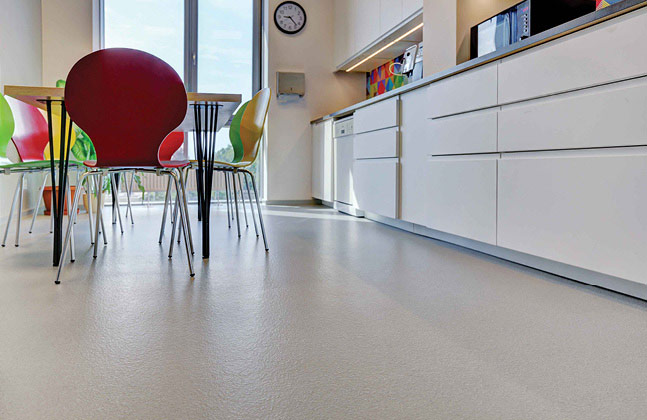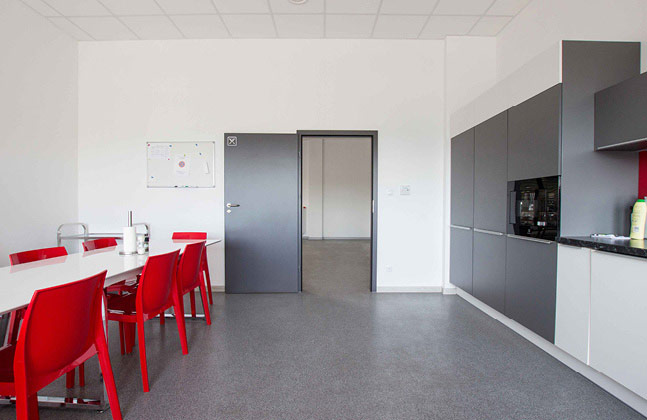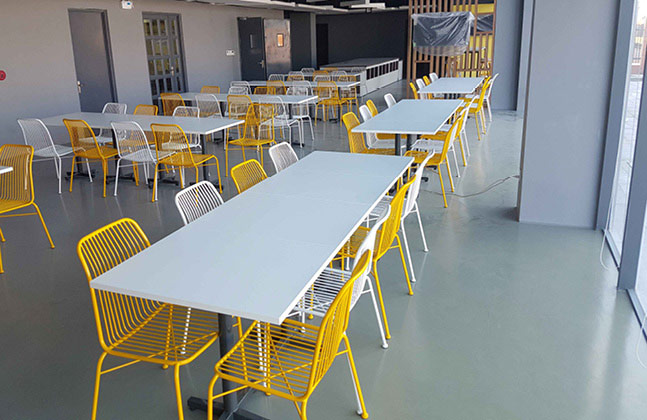Don’t Slip Up On Office Canteen Flooring
16 Oct 2018
Flooring in office canteens needs to be multi-functional to ensure that function meets aesthetics and provides a safe and hygienic space for staff to use on a daily basis.
When specifying the flooring for a canteen several factors must be considered, such as who will be using the space, what they will be using it for and what challenges the floor will face. For office canteens, it can be assumed that staff will be using the space to relax and eat lunch, so the floor is likely to face exposure to spilled food or drink, highlighting two properties that should be specified for the flooring - slip resistance and chemical resistance.
In any area where food or drink is consumed, there is a high chance of spillages and these spillages being cleaned with water. Both of these factors pose a slip risk to those using the space, which can lead to serious injury and even litigation if the facility is seen to be at fault. Therefore, it is important to install a floor with a slip resistance profile that’s up to the task at hand.
In many countries, the slip resistance of floors is measured using the pendulum test. This test is most often performed in situ on a level, finished floor in both wet and dry conditions. The test is designed to mimic when a pedestrian’s heel strikes a wet floor, as this is commonly when someone is likely to slip.
The testing equipment measures the quantity of resistance to the motion of the pendulum slider that is created when the slider comes into contact with the test surface. This test must be performed under wet conditions, unless internal textile floor coverings are present, which should be kept dry. Here a slider makes contact with the test surface over a prescribed distance and the quantity of resistance between the motion of the pendulum against the test surface is measured.
The rubber used on the pendulum’s slider is an important factor, as the choice of rubber can influence the outcome of the test. For this reason, Standards Australia stipulates that Slider 96 rubber should be used for surfaces that are particularly slippery, or are subjected to the risk of becoming as such.
Many countries use Pendulum Test Value (PTV) or “R” Ratings to categorise the levels of slip resistance as determined by the results of a pendulum test. In Australia and New Zealand however, the wet pendulum test was updated to replace the ‘R’ ratings with ‘P’ ratings in 2013. The P Rating system goes from 1 to 5, with 1 providing the least resistance and 5 the most. For office canteen areas the floor should aim to be a P3 rating, as this is the recommendation for public areas when wet – bearing in mind that jut a splash of spilled coffee will suddenly make the floor wet enough to meet this criteria.
Epoxy resin floors and textured polyurethane systems should all be tested for slip resistance, and can be specified to include coloured sand grains or flakes for decorative purposes. Examples of such flooring systems are Flowfresh SRQ and Flowfast SRQ from Flowcrete.
For areas that are likely to experience increased exposure to spillages or more intense and regular cleaning the slip resistance should ideally be over 70 PTV or P5 on the anti-slip ratio. To achieve these high levels of slip resistance, epoxy floors with a highly textured surface, such as that of Flowfresh SR from Flowcrete can be specified.
Flowfresh SR is an antibacterial polyurethane concrete coating that contains natural quartz, providing a decorative and coloured finish. As well as being slip resistant, Flowfresh from Flowcrete is chemical resistant, meaning that natural acids and sugars from food, as well as the chemical cleaners used to clean them will not affect the floor’s finish. The Flowfresh range also contains Polygiene®, an antibacterial additive that can kill up to 99.9% of bacteria that comes into contact with the floor’s surface.
For areas where high levels of surface water are expected, drainage systems should be considered. The position of the drain will determine the direction and level of the floor’s pitch.
Ensuring that the flooring is chosen and applied in the correct manner reduces the chance of surface water. Stagnant surface water poses an increased slip risk, but can also harbour germs if it is not quickly and efficiently drained away, which is a serious health and safety concern. Bacteria thrive on damp conditions, and if this enters the air through evaporation, staff could breath in potentially dangerous bacterium and fall ill. Due to this, a flooring specialist should be consulted to ensure that the flooring complies with a functional drainage system.
Seamless resin floors have no joints for bacteria to hide in, meaning that bacteria can be washed away before it has time to multiply. To go one step further, coving can be specified to abolish the joint between the floor and the wall. This again reduces the hiding places for germs and bacteria, and also makes the space extremely easy to clean.
Getting the right floor is essential to guarantee the operational effectiveness of an office canteen, as well as the safety of the staff that use it. Get in touch with a member of Flowcrete’s expert team to learn more about specifying hygienic and safe solutions for your canteen.
ENDS
Enjoy this post? Click below to share it with your network:
Press Contact
For further information please contact [email protected]
Notes to Editors
Flowcrete is a world leader in the manufacture of seamless industrial and commercial resin flooring solutions. Flowcrete is now part of Tremco Construction Products Group.
Tremco CPG's leading brands have served as the benchmark for excellence and quality products since our first entry of our brands into the Australian region in 1984. Our commitment to serving our clients in a variety of areas with innovative and strategic technology products has allowed us to consistently grow for over 40 years.
Tremco CPG Australia is part of RPM International Inc. and our leading brands include Flowcrete, Tremco, Duram, illbruck, Nullifire, Dryvit, Nudura and Euclid Chemical.
For further information please contact [email protected]
Or visit us on the web at www.tremco.com.au




